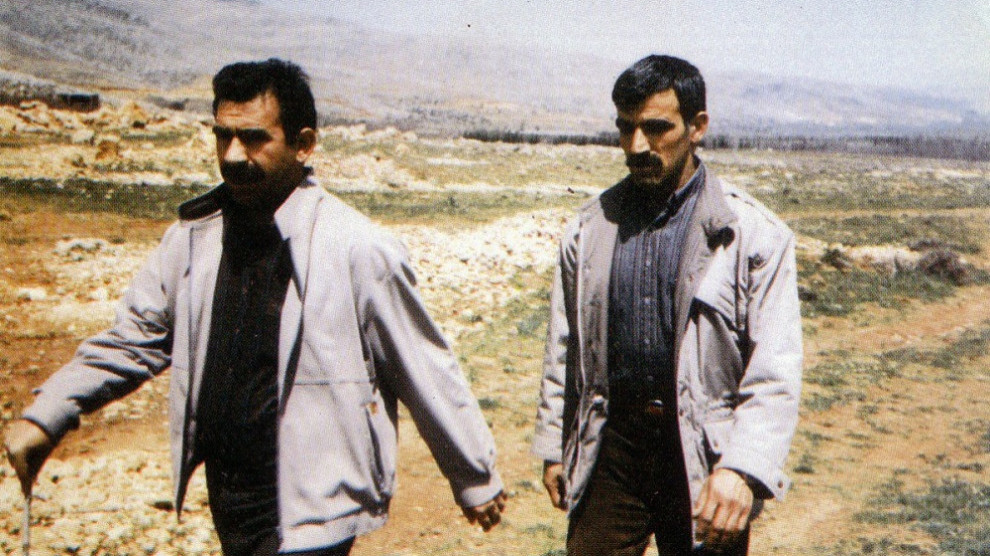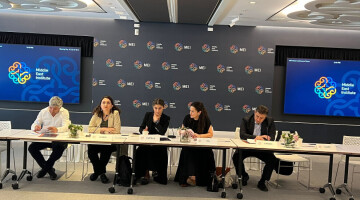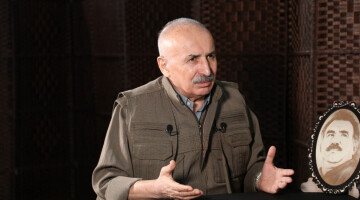The first couple of years after the start of the Kurdish guerrilla struggle on 15 August 1984 were difficult times for the Kurdistan Workers Party (PKK) and Kurdish leader Abdullah Ocalan. While creating a climate of fear for colonialist states and their collaborators, the guerrilla struggle launched by Kurds also directed the efforts of the international forces against the PKK and Abdullah Ocalan.
Nobody could even dream of a popular struggle in Northern Kurdistan, which was ruled by the Turkish military junta that had come into power after the 12 September1980 coup.
After the initial shock caused by guerrilla actions on 15 August, Turkey’s first step was taking the matter to the Northern Atlantic Treaty Organization (NATO). The negotiations that aimed at suppressing the Kurdish armed uprising started in late 1984 and came to a conclusion in mid 1985. The main targets were Abdullah Ocalan and his PKK.
Let’s look at what was happening on PKK’s side at that time…
The Kurdish movement declared the formation of a new organization on 21 March 1985, the Kurdistan Popular Liberation Front (ERNK). Its mission was defined by Abdullah Ocalan as organizing the people of Kurdistan, from women to youth, from workers to intellectuals, from Muslims to Yazidis and Alevis. The following 15 years showed how the ERNK played its role.
In a recent article published on Yeni Ozgur Politika, Duran Kalkan, member of PKK’s Executive Committee, described the critical process following the formation of the ERNK as follows:
“In autumn1984, they aimed at eliminating these ‘handful of bandits’ with actions personally organized by the junta leader, Kenan Evren. But they failed. Guerrillas managed to carry out about 60 military actions. Guerrillas launched an attack against Kenan Evren’s convoy after his visit to Semdinli, a district in the Hakkari province, and killed Evren’s security guards. The Turkish army failed miserably against the Kurdish guerrillas. After this, the Turkish state carried the matter to NATO and called for implementation of the 5th article of treaty. The 5th article reads: “The Parties agree that an armed attack against one or more of the members in Europe or North America shall be considered an attack against them all and consequently they agree that, if such an armed attack occurs, each of them, in exercise of the right of individual or collective self-defence recognised by Article 51 of the Charter of the United Nations, will assist the Party or Parties so attacked by taking forthwith, individually and in concert with the other Parties, any action as it deems necessary, including the use of armed force, to restore and maintain the security of the North Atlantic area.”
Turkish state demanded the application of the 5th article against the PKK. NATO held talks about this and accepted. From 1985 the war against the PKK was organized, planned and executed by NATO. The actions by the Turkish state were all approved by NATO. Turkey put itself in a position in which it could do nothing without NATO’s approval. All special warfare actions were developed in accordance with NATO.
SMEAR CAMPAIGN AGAINST OCALAN
After agreeing on the war against the PKK, the deep structures within NATO found the opportunity that they were looking for. On 28 February 1986, Swedish Prime Minister Olof Palme, who was known for his sympathy towards the Kurdish people, was assassinated in Oslo while he was walking home from the cinema.
Following Palme’s assassination a “witch hunt” targeting the PKK and Kurds were launched in Western Europe. The main target was Abdullah Ocalan. In collaboration with the Turkish press, a huge smear campaign was carried out against Ocalan by Swedish and German media claiming that Palme’s assassination was ordered by him. Their argument was weak and baseless: Ocalan’s visa application was turned down by Sweden and after that he was said to have ordered assassination of Palme.
Some Kurdish organizations and so-called Kurdish intellectuals also helped this lynching campaign. Operations that started in Sweden spread into Germany. On 15 March 1986, all activists attending Kurdish New Year celebrations in the German city of Duisburg were taken under custody and interrogated. According to the German police, Ocalan, who was declared as main suspect of Palme’s assassination, was expected to give a speech via phone at this event. This false tip was given to the German authorities by Kurdish organizations based in Sweden.
Because while the PKK was carrying out a guerrilla struggle under most difficult circumstances in Kurdistan, the number of its followers were rapidly increasing. Sympathy for Ocalan was becoming widespread among those whose hearts were beating for the Kurdish cause. Other Kurdish parties and organizations were losing their social base to the PKK. This was the main reason of the hatred towards Ocalan. Ocalan was viewed as “a member of the lower class” and therefore the leadership of other Kurdish organizations couldn’t accept him as a leader.
But Ocalan was raising the lost hopes of people from every generation. Osman Sabri, a prominent Kurdish intellectual, who would become a close friend of Ocalan in following years, was one of those.
‘APOISTS ARE GOING TO WAR, BUT YOU ARE GOING TO EUROPE’
Born in 1905 Osman Sabri witnessed the Sheikh Saed, Xoybun, Ararat (Agri) and Dersim uprisings. He was a long-time member of Kurdistan Democratic Party led by Mele Mustafa Barzani.
He was a well-respected Kurdish politician in the 1980s. During a visit at his home in Damascus by a group of Kurdish intellectuals who were preparing to flee to Europe, Sabri said “While you are going to Europe, the Apoists are going to Kurdistan. I am telling you; you will lose, they will win.”
Osman Sabri reportedly told Ocalan: “You are making our dreams come true. I have never been prouder in my life”.
Sabri was not the only one who admired the struggle of Ocalan. Dozens of prominent Kurdish politic and intellectual figures were declaring their support for the new Kurdish struggle. One of them was a religious leader, Mele Evdilahe Timoki. Timoki left his hometown in Northern Kurdistan and settled in Rojava (Syrian Kurdistan) after the repression by Turkish state. He visited Ocalan frequently and the two developed a strong relationship. Timoki was very old and Ocalan helped him and laid his prayer rug before prayer.
Sabri and Timoki were not the only ones who developed a close relationship with Ocalan. From the mid 1980s hundreds of Kurdish intellectuals, artists, leaders and journalists visited Ocalan. Most were impressed by Ocalan’s modesty and the discipline of the PKK militants. Contrary to leaders before him, Ocalan managed to become the leader of Sunnis, Alevis, Yazidis, the rich and the poor, women, villagers, intellectuals, people from all four parts of Kurdistan.
RESPONSES TO THE 1986 CONSPIRACY
Going back to the year of 1986, a critical stage in Kurdish struggle, Mahsun Korkmaz (Egid) the commander of 15 August, fell martyr on 28 March 1986. The Kurdish movement had its third congress on October 1986 as a response.
The PKK reorganized its armed wing under the name of Kurdistan Popular Liberation Army (ARGK). The warzones in Kurdistan were divided to states and the first example of criticism and self-criticism was implemented.
The Kurdish movement also established a military academy and named it Mahsun Korkmaz Academy to train its guerrilla forces. The academy was based in the Bekaa Valley, in Lebanon. Hundreds of guerrilla fighters and commanders were trained in this academy. Here, Kurdish leader Ocalan made his first public appearances and was met with “Biji Serok Apo – Long Live President Apo” slogans. The Mahsun Korkmaz Academy became the focal point of interest, not only for regional powers but also for international media.
ASSASSINATION OF HAMZA BINDAL
Ocalan faced very serious threats several times during these years. In fact, Ocalan was targeted in early days of the Kurdish movement. His vehicle was sprayed with bullets while he was traveling from Hilvan to Hosin, districts of Urfa province on 18 May 1978. Ocalan was there to organize the resistance which developed after killing of Halil Cavgun, one of the first cadres of the Kurdish movement. Ocalan survived this attack unhurt.
On 25 January 1990, Abdullah Ocalan’s childhood friend Hamza (Hasan Bindal) was assassinated by Topal Metin (Sahin Balic) during a military practice. Ocalan launched a deep investigation on this issue and launched a struggle against “gang-like practices” within the PKK. Ocalan described Semdin Sakik (Zeki), Sahin Balic (Topal Metin), Halil Kaya (Kor Cemal) and Cemil Isık as “the gang of four” and called the Second Party Conference. On this issue Ocalan wrote:
“From the early 90s, we could hear the steps of internal and external conspiracies. The killing of my childhood friend Hasan Bindal by a so-called stray bullet is an event that contains a lot of mysteries. It’s very likely that Sarı Baran, Mehmet Sener and Sahin Balic, who were commanders of that camp, organized this conspiracy. Had I believed them, this conspiracy would have ended with the elimination of myself. At that time two official spies spoke to Star TV in defense of Cem Ersever (a well-known Turkish contra-guerrilla commander) and said: ‘We didn’t fail. We would have killed him if we had wanted to, but they wanted us to capture him alive.’ These confessions hold some truth in it. They could have easily achieved this with the help of the gangs within the PKK. They wanted to keep me alive and they wanted to eliminate me after gangs capture all positions of the PKK. Because of that they firstly planned to eliminate all honest and committed cadres.”
The PKK held its 4th Congress in the last days of 1990. The delegates of the congress declared unity around Kurdish leader Abdullah Ocalan. The Fourth Congress was the first party assembly in Kurdistan soil after the First Party Congress in 1978. Ocalan didn’t attend this congress in person but presented a Political Report.
The first half of the 90s was marked by popular uprisings in Nusaybin, Cizre and Amed and actions of Kurdish guerrilla which erased several Turkish outposts from the map. At the same time the legal Kurdish political struggle started. Kurdish leader Ocalan was at the centre of these developments and therefore targeted attacks against him became more frequent both from inside and outside.
RELATED NEWS:














